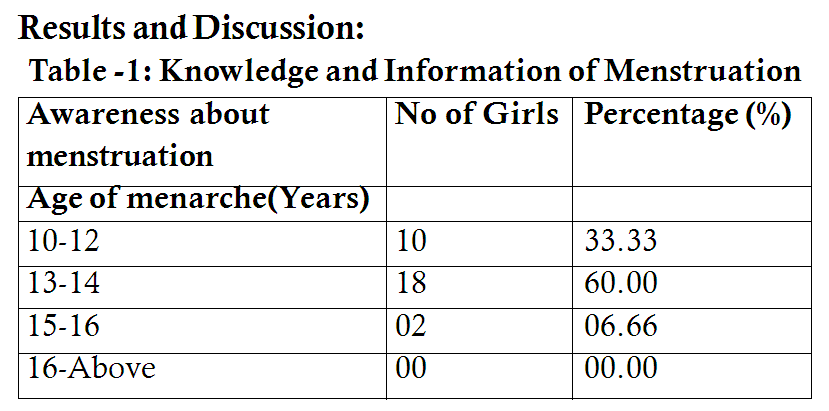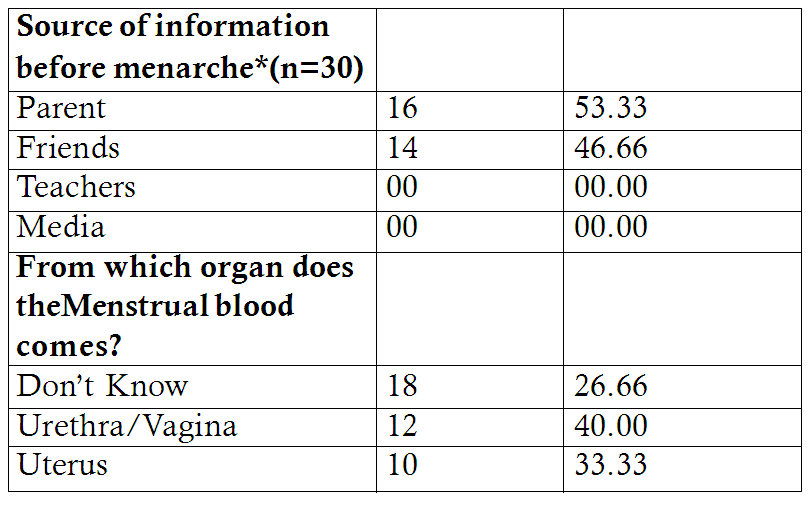Menstrual Hygiene: Knowledge and Attitude among Adolescent Girls Residing in Observation Home.4/11/2017 Sanjeevkumar Y. Yaliballi Abstract The word adolescence comes from a Latin word ‘adolescere’meaning to grow in maturity. In the life of every adolescent girl menarche is a significant event. It marks the transition of girlhood to a woman hood. This transitional period is marked with onset of Menarche which is the one of most important physiological changes occurring among girls during the adolescent year. It heralds the onset of physiological maturity in girls. Menstruation is generally considered as unclean in Indian communities. Girls and women are subjected to restrictions in their daily life simply because they are menstruating. Beside the health problems due to poor hygiene during menstruation, there seems to be substantial lack of knowledge about menstruation and its management among girls living in observation home. Aims and Objectives: To assess the knowledge and practices of menstrual hygiene among girls living in observation home. Material and Method used: The present study was conducted on girls aged between 13-16 yeras living at Government observation home at Vijayapura city, Karnataka State. A total of 30 students were selected for the study using the simple random sampling method and a structured interview schedule was used to collect information from the respondents. The data collection technique was personal interview of the study subjects. Result: The major source of information about menstruation for them was found to be parents. Second source of information was their friends. Majority of girls had no information about use hygienic cloths or pads used in menstruations. Only 30% of girls taking help of doctors when they experience menstrual problems like excessive bleeding and pain. Conclusion: This study highlighted the need of accurate information about menstruation and its appropriate management. As parents are major source of information needs to be given informal education to the parents particularly mothers of the girls, so that mother can give appropriate information to her growing child. Doctors and teachers are also very important source of accurate information to guide the girls in observation homes. It is essential to design a mechanism to address and for the access of healthy menstrual knowledge. Key words: Adolescent girls, menarche, menstruation hygiene. Introduction Menstruation is a regular cycle of bleeding par vagina is a natural and necessary process in girls in order to develop reproductive capabilities. With the onset of menstruation the ovaries begin to release ova, and thus a girl becomes capable of bearing a child. Every month the ovaries release an egg. In anticipation of possible fertilization the uterus prepares itself with a thick lining of blood for the protection, safety and the nutrition of the fetus (baby). If the fertilization doesn’t take place the thick lining of blood is not required. Thus, the thick lining of blood disintegrates and starts flushing out of the vaginal opening along with the ovum. The flushing out continues for three to seven days and is called menstruation or periods. Menstruation is a major stage of puberty in girls. It’s one of the many physical signs that girl is turning in to a woman. Menstruation can be confusing, just like a lot of other changes come with puberty. Many girls don’t have a complete understanding of a woman’s reproductive system or what actually happens during the menstrual cycle, that can make the process even more mysterious. Beside this, menstrual taboos with socio cultural aspect among society generally create chaos among adolescence girls. As a ritual, during menstruation, girls are prohibited from participating normal life activities like participating in kitchen, sleeping with family members, playing with friends. Isolation in their own home, social and religious restrictions brings feeling of awkwardness among menstruating girls. Adolescent girls were found skipping schools mentioning menstrual problem as major reason. This situation can have a negative impact on girls and young women. Many young girls are forced to skip school during their period as they are embarrassed or do not have access to the facilities they need, while others drop out altogether. “When girls drop out of school at an early age, they are less likely to returns to education, leaving them vulnerable to early marriage, violence and forced to sexual relations” says Saywell. Aims and Objectives: The aim of this study was to know how much information the institutionalised girls have about menstrual hygiene and sanitation. This study aimed to provide information to the institute, to help them in planning and implementing some new plans in order to address the problems regarding menstrual cycle and hygiene.
Material and Method: For the present study adolescent girl’s age between 13-16 years studying at high school in Vijayapur city of Karnataka were the study population. A total of 30 students from 8th, 9th and 10th standered were selected using simple random sampling method. After obtaining informed consent from the participants and permission from the superintendent of the Girls Home, structured questionnaire on “Menstrual hygiene: Knowledge and practice among adolescence school girls staying in Balakiyar mandir(GIRLS HOME),VIJAYAPUR.The trainee social work students(Female) were chosen for interviewing girls. The exclusion standards for the sampling group were females who were not willing to participate in the research themselves and girls not reached menarche. The Study represents the demographic details of the study subjects. A majority (56%) of girls were from joint family and nuclear families were (44%), mothers of the girls were mostly illiterates. The majority of girls learnt about menstruation from their mothers(53.33), sisters and female friends(46.66%). Teachers were not considered as the source of information on menstruation. The information they received were mainly regarding the practices of rituals, restrictions, precautions about behaviour towards men and boys. Very little information was shared regarding menstruation. In the present study, Only 33.33% of the study girls stated that menstrual bleeding come from the uterus and remaining all were unaware(Don’t know-26.33% and from Urethra and vagina-40%) of the source of the menstrual bleeding. Menstrual Hygiene This present study revealed that a good number of girls (40%) used old clothes as menstrual pads and those they reused the clothes after washing them with soap and water. They discarded the clothes by burning (20.00%) them or throwing them with the routine waste (73.33%) after using it for a few months. Very few girls (33.33%) used sanitary pads as absorbent which were available in the market; possibly due to their low socioeconomic status, lesser availability of the pads and lack of awareness. Poor menstrual hygiene causes great impact in increased vulnerability to reproductive tract infections (RTI). Currently millions of women sufferers from RTI and infection are transmitted to the offspring. Women having knowledge regarding menstrual hygiene are less vulnerable to RTI and its consequences. Therefore, increased knowledge about menstruation from adolescent period help in decreased suffering of millions of women. Various studies indicate that a huge information gap exists among rural and urban adolescent girls regarding menstrual hygiene Restrictions during menstruation are common in India. The most frequent were restrictions in visiting places of worship, and touching religious items or praying. Other common restrictions were food related. In some homes, girls reported sleeping separately, sitting separately from household members during menstruation. Girls faced fewer restrictions in cooking, household work, exercise and playing, but more in moving in and out of the house, and attending social attending social functions. School absenteeism (76.66%) associated with menstruation; Girls’ reasons for absence were physical discomfort or pain, lack of water, hygiene and disposal facilities in school toilets, fear of staining their clothes and restrictions imposed by relatives or teachers.
Recommendations This study has highlighted the need of adolescent girls to have accurate and adequate information about menstruation and its appropriate management. Formal as well as informal channels of communication such as mothers, sisters and friends, need to be emphasized for the delivery of such information. Role of the mothers seems to be very vital, it is very important that the mother be armed with the correct and appropriate information on reproductive health, so that she can give this knowledge to her growing girl child. It is also essential for the teachers, particularly female teacher who may not have the necessary skills to impart reproductive health education, including menstrual hygiene to their students. They have to be given requisite skills – usually through training or workshops. Much more efforts are needed to curb the misbelieves and taboos among the adolescent school girls. There is a strong need to address issues like the restrictions which are imposed on or practiced by the adolescent school girls in the Balamandira(Girls Home). Considering the lesser use of sanitary pads by the adolescent girls, there is a need to mobilize adolescent girls to use sanitary pads. Organizations which work on reproductive health should work adequately on the neglected issue of menstrual hygiene and management to achieve. Conclusion Menstruation is an important physiological process in girl’s life. Menstrual hygiene, a very important risk factor for reproductive tract infections, is a vital aspect of health education. Complications of not keeping good hygiene in the time of menstruation are severe, particularly when they get infection and often the infection is transmitted to the offspring of the pregnant mother. Before bringing any change in menstrual practices they should be educated about the facts of menstruation and its physiological implications. The girls should be educated about the significance of menstruation, selection of a sanitary menstrual absorbent and its proper disposal. This can be achieved through compulsory sex education in school programmes and knowledgeable parents and trained teachers or unnecessary restrictions, so that she does not develop psychological upset and the received education would indirectly wipe away the age old blind beliefs and make her to feel free to discuss menstrual matters without any inhibitions to keep herself healthy. Acknowledgement I would like to take this opportunity to express our sincere gratitude to all those who have in some way contributed to bring this study in the final shape. In particular, I would like to thank the adolescent school girls who participated in this study with all enthusiasm. Special gratitude goes to Superintendent of Balamandira at Vijayapura for their constant support. Similarly, we are very much thankful to all social work students for coordinating and supporting for data collection. I hope this study will serve the purpose of informing the strategies and actions for any concerned stakeholders in improving the menstrual hygiene and management particularly in adolescent school girls.) Bibliography:
Sanjeevkumar Y. Yaliballi Guest Lecturer, Department of Social Work, Karnataka State Women’s University, Torvi, Vijayapura, Karantaka. |
Categories
All
Social Work Learning Academy50,000 HR PROFESSIONALS ARE CONNECTED THROUGH OUR NIRATHANKA HR GROUPS.
YOU CAN ALSO JOIN AND PARTICIPATE IN OUR GROUP DISCUSSIONS. MHR LEARNING ACADEMYGet it on Google Play store
|
SITE MAP
SiteTRAININGJOB |
HR SERVICESOTHER SERVICESnIRATHANKA CITIZENS CONNECT |
NIRATHANKAPOSHOUR OTHER WEBSITESSubscribe |
MHR LEARNING ACADEMY
50,000 HR AND SOCIAL WORK PROFESSIONALS ARE CONNECTED THROUGH OUR NIRATHANKA HR GROUPS.
YOU CAN ALSO JOIN AND PARTICIPATE IN OUR GROUP DISCUSSIONS.
YOU CAN ALSO JOIN AND PARTICIPATE IN OUR GROUP DISCUSSIONS.
|
|











 RSS Feed
RSS Feed





